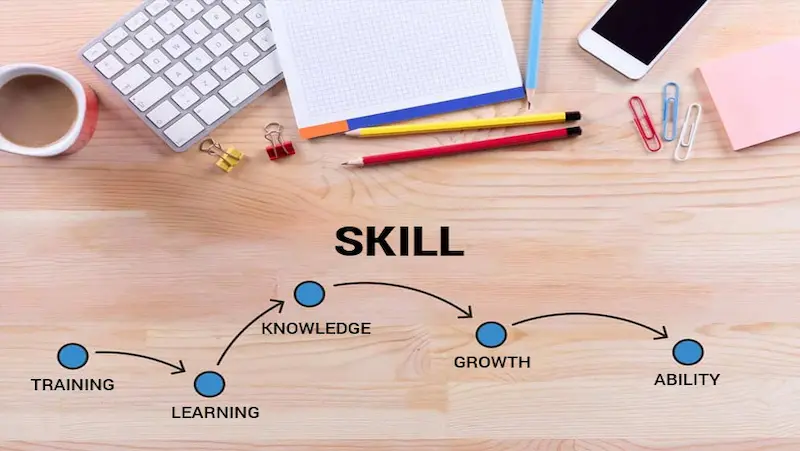In the grand symphony of our lives, our careers often play the lead melody. Career growth isn’t just about climbing the corporate ladder; it’s the rhythm that adds purpose, fulfillment, and progress to our journey. In this bustling world, where change is the only constant, understanding why career growth matters becomes essential. It’s the compass that guides us through the maze of choices, helping us navigate toward a future where our ambitions and potentials find their true expression. So, let’s explore why this pursuit isn’t merely a cliché but a vital narrative in the story of our lives.
Table of contents
The Fundamentals of Career Growth

Handling Setbacks
1. Dealing with Rejections
Rejections are a part of life, and they sting. Whether it’s a job application, a business proposal, or a personal relationship, rejection can feel like a punch in the gut. It’s okay to feel disappointed, but remember that rejection doesn’t define your worth. Take a moment to process your feelings, then focus on what you can learn from the experience. Use rejection as a stepping stone to improvement, not as a roadblock.
2. Bouncing Back from Failures
Failure is a word that often carries a heavy burden. But, think of it this way: failure is just a stepping stone to success. When you stumble, it’s an opportunity to learn, grow, and evolve. Don’t be afraid to fail; be afraid of not trying. Embrace your failures, analyze what went wrong, adjust your approach, and get back in the game with renewed determination.
Adapting to Industry Changes
1. Staying Current and Adaptable
The business world is constantly evolving, and those who adapt thrive. Staying current means keeping your skills, knowledge, and strategies up to date. Make continuous learning curve a habit. Attend workshops, read industry news, and network with peers. The more adaptable you become, the better equipped you’ll be to handle any changes that come your way.
2. Embracing Innovation
Innovation isn’t just a buzzword; it’s a necessity in today’s fast-paced world. Whether you’re an entrepreneur or an employee, embracing innovation can set you apart. Be open to new ideas, technology, and processes. Don’t be afraid to challenge the status quo. Innovation often leads to creative solutions and new opportunities.
The Role of Skill Development

Continuous Learning
1. Lifelong Learning Mindset
The journey of continuous learning starts with adopting a lifelong learning strategies mindset. It’s about recognizing that education doesn’t end with a degree; it’s an ongoing process. This mindset encourages curiosity, a thirst for knowledge, and the willingness to adapt to new challenges. By embracing this attitude, you open doors to personal growth and career opportunities you might not have imagined.
2. Identifying Relevant Skills
To embark on the path of continuous learning effectively, you need to identify the skills and knowledge that are most relevant to your current or desired career. Stay updated on industry trends, research job requirements, and speak to professionals in your field. This helps you pinpoint the areas where you can make the most significant impact with your learning efforts.
Training and Certification
1. Pursuing Further Education
Further education is a common and effective way to enhance your skills and knowledge. It might involve pursuing a master’s degree, taking online courses, or enrolling in workshops and seminars. The key is to choose an educational path that aligns with your career goals and provides you with the necessary tools to excel in your chosen field.
2. Professional Certifications
Professional certifications are like badges of expertise. They validate your skills and knowledge in specific areas and can boost your credibility in the job market. Whether you’re in IT, healthcare, finance, or any other industry, there are certifications available to enhance your professional profile. Research which certifications are highly regarded in your field and consider pursuing them to stand out from the competition.
Effective Personal Branding

Crafting Your Personal Brand
1. Defining Your Unique Value Proposition
Your unique value proposition (UVP) is like your secret sauce. It’s what sets you apart from the rest. To define your UVP, ask yourself: What makes you, well, you? What skills, experiences, or qualities make you uniquely qualified for your chosen field? Once you’ve got that figured out, use it as your guiding star in all your personal branding efforts.
2. Online and Offline Branding
Your personal brand isn’t limited to the online realm. It’s a fusion of your online presence and real-life interactions. Make sure your digital persona aligns with who you are in person. Attend networking events, workshops, and conferences to reinforce your brand with face-to-face interactions. Your personal brand should be consistent both online and offline, creating a seamless impression.
Online Presence
In today’s digital age, your online presence can be your most potent weapon in the personal branding game. Here’s how to supercharge it:
1. Optimizing LinkedIn Profile
LinkedIn is the social media platform for professionals. It’s where you tell your career story. So, ensure your LinkedIn profile is up to date, with a professional photo, a compelling headline, and a well-crafted summary. Connect with industry peers, join relevant groups, and share insightful content. Your LinkedIn profile is often the first stop for those wanting to learn more about you professionally.
2. Blogging and Thought Leadership
If you’re passionate about a particular field or industry, let your expertise shine through blogging. Share your insights, experiences, and unique perspectives. Blogging not only establishes you as a thought leader but also boosts your online visibility. Remember, consistency is key here. Regularly publishing valuable content can keep your audience engaged and coming back for more.
Effective Time Management

Time Management Strategies
1. Prioritization Techniques:
When it comes to time management, the first step is setting priorities. Not all tasks are created equal, and understanding which ones are most important is crucial. Start by identifying your high-priority tasks and focus your energy on completing them first. This way, you’ll tackle the most significant tasks while reducing the stress of impending deadlines.
2. Time-Blocking and Goal Setting:
Time-blocking is a technique that involves dedicating specific blocks of time to specific tasks. It’s a bit like creating an appointment with yourself for work, exercise, relaxation, or family time. Pair this with clear goal setting to make the most of your time. Set SMART (Specific, Measurable, Achievable, Relevant, and Time-bound) goals to keep yourself motivated and on track.
Work-Life Balance
1. Maintaining Well-Being:
Your well-being should always be a top priority. Don’t neglect self-care. Make time for regular exercise, a healthy diet, and enough sleep. Incorporate relaxation techniques like mindfulness or meditation into your routine to reduce stress. Remember, a healthy body and mind are essential for peak productivity.
2. Avoiding Burnout:
Burnout is real, and it can have severe consequences on your health and work performance. To avoid burnout, set clear boundaries between work and personal life. When your workday is over, disconnect from emails and work-related tasks. Spend quality time with loved ones, pursue hobbies, or simply unwind. Remember that taking breaks and vacations is not a luxury; it’s a necessity.
Achieving Career Growth in Specific Fields

Career Growth in Technology
1. Tech-Specific Skill Development
The technology landscape is ever-evolving, making skill development crucial. But here’s the catch: It’s not about cramming every new language or framework. Instead, focus on mastering a few key skills that align with your career goals. Dive deep into areas you’re passionate about, whether it’s AI, web development, or cybersecurity. Specialization can set you apart.
2. Staying Current in Tech Trends
The continuous learning experience is the name of the game in tech. However, it’s not just about certificates and courses. Stay curious, explore side projects, and engage with tech communities. Networking with like-minded individuals can be an invaluable source of inspiration and knowledge. Embrace change as a constant companion, and you’ll thrive.
Career Growth in Management
1. Leadership Skills
Management isn’t just about bossing people around. It’s about inspiring and guiding a team to success. Developing leadership skills is pivotal. Take the time to understand your strengths and weaknesses. Effective leaders are self-aware and adaptable, knowing when to take charge and when to empower their team members.
2. Managing Teams Effectively
A manager’s success hinges on their ability to manage teams efficiently. This means fostering a positive work environment, setting clear expectations, and facilitating open communication. Remember, it’s not about micromanaging but empowering your team to excel. Encourage collaboration and trust your team’s expertise.
Conclusion
In conclusion, embracing essential career growth strategies is like nurturing a seed that eventually grows into a strong tree. It’s about continuous learning resources, networking, adaptability, and a dash of courage. Remember, success is not just about reaching the destination; it’s about enjoying the journey and becoming the best version of yourself along the way. So, keep striving, stay open to new opportunities, and watch your career flourish.
To get your hands on more such articles, educational content, and free resources on coding for kids, robotics courses, game development, etc., check out the BrightCHAMPS Blog Page now!
Frequently Asked Questions
A1. The speed of your career growth can vary, but consistent effort and skill development can yield noticeable progress within a few months to a year.
A2. Not always. You can achieve career growth within your current job by seeking new responsibilities and skills, but changing jobs can also open up new opportunities.
A3. Introverts can network effectively by focusing on quality connections, attending smaller events, and using online platforms to build relationships at their own pace.
A4. Signs may include feeling stagnant, uninterested in your work, or lacking opportunities for advancement within your current role or organization.
A5. Stay motivated by setting clear goals, celebrating small achievements, seeking mentorship, and reminding yourself why you started the journey in the first place.


 We are an army of educators and passionate learners from BrightChamps family, committed to providing free learning resources to kids, parents & students.
We are an army of educators and passionate learners from BrightChamps family, committed to providing free learning resources to kids, parents & students.














